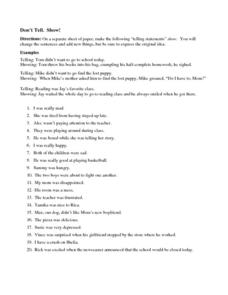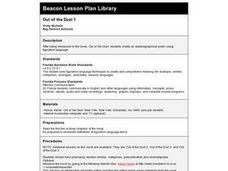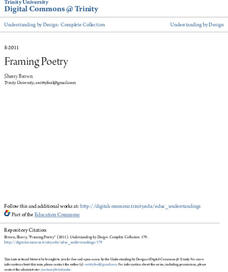Curated OER
Guided Imagery: Canyons, Chapter 8
Individuals use words or illustrate what they experience during a reading of a passage from chapter eight of Gary Paulsen's Canyons. Complete directions for the guided imagery exercise, and a suggested passage, are included with the...
Curated OER
Easter Egg Surprise
Young readers describe objects by using describing words. After reviewing the five senses, they use their senses to gain information about an object. Then as homework, they write three descriptive words about a mystery object and place...
Curated OER
Enhancing Poetry with American Memories
Pupils explore poetry using American Life Histories: Manuscripts from the Federal Writers' Project. They compose their own unque "found poetry" based on the stories found in the collection.
E Reading Worksheets
Don't Tell. Show!
As part of a study of narrative writing, young story tellers are asked to revise 20 telling sentences and create showing ones.
Curated OER
Poetry: What's on Your Plate?
Students create original poetry on the subject of food. In this poetry writing lesson, students use sensory details about a food item to create a class poem. Students then write short poems with one sensory detail and add another...
Curated OER
Message in a Bottle
Sixth graders write a short story about being stranded on a deserted island. After a brief geography review of locations at various latitudes and longitudes, 6th graders draft their story about being stranded. They use sensory and...
Curated OER
Out of the Dust 1
Pupils review figurative languages terms and examples. They read the first entry in the book, Out of the Dust, and discuss the images created by the author. Then they create an autobiographical poem using figurative language.
Curated OER
Dear Diary
Students analyze a piece of writing by creating diary entries based on a character. In this reading comprehension lesson plan, students read an assigned book with their classmates and create a sketch of what they believe the main...
Curated OER
Reliving History through Slave Narratives
Helpful for an American literature or history unit, this lesson prompts middle schoolers to examine slavery in the United States. They read slave narratives that were part of the Federal Writers' Project and then conduct their own...
Curated OER
Lesson Plan 18: Art Project! Design Your Own Book Cover
Finished your novel? What’s next? Designing the book cover, of course. But how to begin? After examining the covers of published books and noting the common elements of these jackets, young novelists design a front and back cover for...
Trinity University
Framing Poetry
The big idea in this poetry unit plan is that structure and content work together to create meaning. Class members learn how to identify and mark the metrical patterns and line lengths used in poems. They study the structure of various...
Curated OER
Imagery: Show, Don't Tell
A vampire, the beach, a bedroom, the school cafeteria. Writers are encouraged to add sensory details (sight, touch, taste, smell, sound) to bring these things to life.
Curated OER
Dancing through Poetry
Get your class up and moving as they explore how to express movement and dance through words. Designed around two poems by Lillian Morrison about break dancing, the activity truly captures the creative and multi-sensory aspects of...
Curated OER
Cardboard Radial Weaving
Students explore cultural history by participating in an arts and crafts activity. In this weaving lesson, students identify the many cultures that used weaving methods and local plant life to create baskets and other useful tools....
Curated OER
Writing a Personal Narrative
What is the difference between a news story and a personal narrative? This plan has learners write a personal narrative using the topic of service projects in their community. Consider completing a cross-curricular extension by bringing...
Curated OER
Every Dog Has Its Day
Students explore the use of imagery in writing. In this writing lesson, students create a writing piece that features sensory images without resorting to the use of clichés.
Curated OER
What Is It? Tommy Tastes
Students complete multi-curricular to learn about senses and sensory words. In this sensory words lesson, students discuss the five senses and the anatomy of a tongue. Students complete a food tasting activity and find descriptive words...
Curated OER
My Favorite Room - Brainstorming Sheet
In this writing worksheet, students brainstorm a writing piece about their favorite room. They write a purpose sentence, and fill a chart that describes the room using the senses. They write a draft using the purpose sentence and three...
Curated OER
Lesson Three: Go Free or Die
Fourth graders look for sensory details and figurative language. In this reading strategy lesson, 4th graders read the story Go Free or Die by J. Ferris and complete a chart with figurative language. They use a word wall in the class to...
Curated OER
Forms of Poetry
Pupils identify distinguishing features of poetry. They identify and use literary terminology including symbol, theme, simile, and alliteration. They recognize the effects of language.
Hachette Children’s Group
Our Five Senses
Show your class how to experience their world with the five sense. With worksheets on each sense, learners investigate their surroundings and categorize them into sight, smell, touch, hearing, and taste.
ETFO
Free Verse Poetry Rubric
Follow poetry instruction with a four-category rubric designed to guide budding poets' writing of free verse poetry.
Novelinks
Zach’s Lie: Guided Imagery
Close your eyes and picture a time where you decided to tell the truth to someone. What were you wearing? How did you feel? Such prompts begin a guided imagery activity for Zach's Lie. Directions for creating an environment conducive to...
K12 Reader
An Interesting Animal
"Lions and tigers and bears, oh my!" Primary graders write about an animal that interests them, describing what it looks like, where it lives, and what it eats.

























